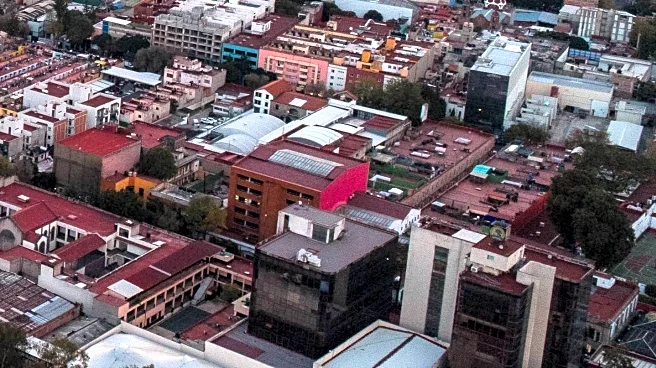What is the story about?
What's Happening?
Mexico City is experiencing significant cultural and economic shifts due to the influx of digital nomads, primarily in the Roma-Condesa corridor. This trend has led to increased resentment among locals, as storied neighborhoods are transformed into playgrounds for short-term residents who pay in dollars but do not contribute to local taxes. The presence of digital nomads has resulted in cultural changes, such as the requirement for restaurant servers to be bilingual and the widespread availability of English menus. Additionally, the real estate market has seen a sharp increase in rents, with some areas experiencing a 45% rise since 2020. The city now hosts tens of thousands of short-term rental units, contributing to the gentrification of neighborhoods and sparking protests against the displacement of local residents.
Why It's Important?
The gentrification of Mexico City has broader implications for the city's economy and social fabric. While the real estate, hospitality, tourism, and restaurant industries are thriving, the displacement of local residents and the cultural homogenization of neighborhoods pose significant challenges. The economic benefits brought by digital nomads are countered by the lack of local tax contributions, leading to calls for a 'Gringo Tax' to support displaced communities. The protests and activism surrounding gentrification highlight the need for sustainable urban development policies that balance economic growth with social equity. The situation in Mexico City serves as a microcosm of global urban challenges, where the influx of foreign capital and residents can lead to cultural and economic tensions.
What's Next?
Local activists and affected residents are organizing roundtables and online groups to address the impacts of gentrification. The governments of President Claudia Sheinbaum and Mayor Clara Brugada have made initial attempts to regulate the short-term rental market, but further action is needed to protect local communities. The discourse around gentrification is evolving, with sympathetic newcomers exploring creative methods to mitigate their impact. The July 4 protests against gentrification have sparked a substantive dialogue on housing crises and the role of real estate conglomerates. As Mexico City continues to attract digital nomads, the city must navigate the complexities of urban development to ensure that economic growth does not come at the expense of cultural and social integrity.
Beyond the Headlines
The gentrification of Mexico City raises ethical questions about cultural preservation and the responsibilities of foreign residents. The transformation of neighborhoods into hubs for digital nomads reflects broader trends of Americanization and globalization, challenging traditional customs and social norms. The city's culinary landscape, a key attraction for visitors, is also affected, with fears of cultural dilution as restaurants cater to foreign tastes. The situation underscores the importance of cultural sensitivity and the need for tourists to engage with local customs and communities respectfully. As Mexico City grapples with these changes, the city must find ways to integrate newcomers while preserving its rich cultural heritage.















